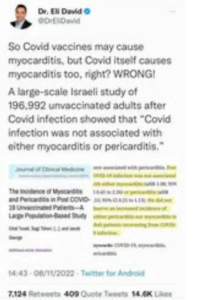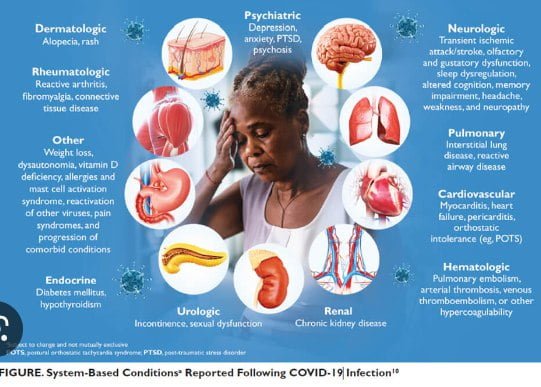Do you remember long Covid? Or what is known as post Covid-19 syndrome whereby for some people who start suffering from Covid-19 end up with symptoms that last much longer than 12 weeks?
We were told that the most common symptoms of long Covid are extreme tiredness shortness of breath loss of smell and muscle aches. Other symptoms are brain fog chest pain insomnia heart palpitations dizziness pins and needles joint pain depression and anxiety tinnitus diarrhoea stomach aches loss of appetite high temperature cough headaches sore throat changes to sense of smell or taste and rashes.
We were also told that besides other vital organs long COVID can lead to long-term effects on the cardiovascular system inducing myocarditis and pericarditis. Most often the heart damage caused by long COVID is due to the formation of very small clots that block tiny blood vessels in the heart muscle.
Thus long Covid became a new condition to be studied. One such study happened to be done by local experts among whom we find Christopher Barbara and Stephen Fava. The others are Jessica-Marie Barbara Jessica Gatt Rachel-Anne Xuereb Nicholas Tabone Adami Jessica Darmanin Renee Erasmi and Robert G Xuereb.
The study entitled “Clinical outcomes at medium-term follow-up of Covid-19” published on 15thSeptember 2022[1] selected randomly 2 646 patients from all individuals who were diagnosed with Covid-19 who were then interviewed together with the taking of blood investigations in order “to assess the persistence of symptoms and health-related quality of life.”
The results showed that “A significant proportion of patients were symptomatic at a median follow-up of 142 days and felt worse than 1 year previously. Hospitalised patients had more biochemical and haematological abnormalities compared to non-hospitalised ones suggesting ongoing inflammation in subjects who were more severely affected by the disease.”
But it happens that another study published earlier exactly in April 2022 entitled “The Incidence of Myocarditis and Pericarditis in post Covid-19 unvaccinated patients – a large population-based study” carried out by Ortal Tuvali et. al has showed that “Covid infection was not associated with either myocarditis or pericarditis.”[2]
This large-scale study of 1996 992 unvaccinated adults has showed that it is not true that Covid including long Covid causes myocarditis or pericarditis. In other words the increase in the incidence of myocarditis or pericarditis was among those who took the jab. I remind the public that we were told that Covid and long Covid may cause both myocarditis and pericarditis. Now this study has proven that the latter is wrong meaning that it has smashed the long Covid lie and that the culprit of such cardiac issues are only due to Covid-19 vaccines. In fact the risk of myocarditis and pericarditis after receiving the vaccines was increased across multiple age and sex strata and was highest after the second dose in adolescent males and young men.
Quoting the abstract of such study it states:
“Myocarditis and pericarditis are potential post-acute cardiac sequelae of COVID-19 infection arising from adaptive immune responses. We aimed to study the incidence of post-acute COVID-19 myocarditis and pericarditis. Retrospective cohort study of 196 992 adults after COVID-19 infection in Clalit Health Services members in Israel between March 2020 and January 2021. Inpatient myocarditis and pericarditis diagnoses were retrieved from day 10 after positive PCR. Follow-up was censored on 28 February 2021 with minimum observation of 18 days. The control cohort of 590 976 adults with at least one negative PCR and no positive PCR were age – and sex -matched. Since the Israeli vaccination program was initiated on 20 December 2020 the time-period matching of the control cohort was calculated backward from 15 December 2020. Nine post-COVID-19 patients developed myocarditis (0.0046%) and eleven patients were diagnosed with pericarditis (0.0056%). In the control cohort 27 patients had myocarditis (0.0046%) and 52 had pericarditis (0.0088%). Age (adjusted hazard ratio [aHR] 0.96 95% confidence interval [CI]; 0.93 to 1.00) and male sex (aHR 4.42; 95% CI 1.64 to 11.96) were associated with myocarditis. Male sex (aHR 1.93; 95% CI 1.09 to 3.41) and peripheral vascular disease (aHR 4.20; 95% CI 1.50 to 11.72) were associated with pericarditis. Post COVID-19 infection was not associated with either myocarditis (aHR 1.08; 95% CI 0.45 to 2.56) or pericarditis (aHR 0.53; 95% CI 0.25 to 1.13).
We did not observe an increased incidence of neither pericarditis nor myocarditis in adult patients recovering from COVID-19 infection.”
Hence while one study solidifies the existence of long Covid and its side effects another one smashes it as a lie for good.

[1]https://pubmed.ncbi.nlm.nih.gov/36369815/
[2]https://pubmed.ncbi.nlm.nih.gov/35456309/

